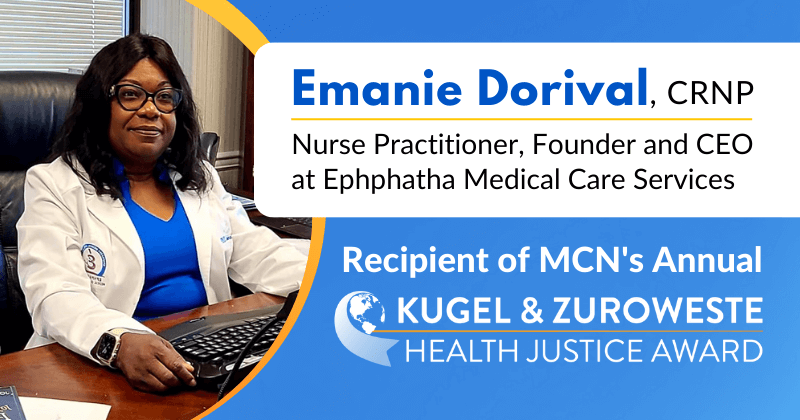Emanie Dorival, CRNP, Recipient of MCN’s Third Annual Kugel & Zuroweste Health Justice Award

Migrant Clinicians Network (MCN) is thrilled to announce Emanie Dorival, CRNP is this year’s recipient of the prestigious Kugel-Zuroweste Health Justice Award.
Named after MCN’s own Candace Kugel, FNP, CNM, MS and Founding Medical Director Ed Zuroweste, MD, the Kugel-Zuroweste Health Justice Award recognizes a frontline clinician who, despite being early in their career, is making a significant impact at the intersections of health, migration, and vulnerability. Since 2020, Kugel and Dr. Zuroweste have fronted a committee comprised of internal MCN staffers and external MCN supporters to select the award’s annual recipient. This year, the committee chose Dorival among many highly qualified nominees.
“She’s just so fearless,” Dr. Zuroweste said. “She is dedicated to this community, no matter what the obstacle. She is an absolute star and exactly who we want” to celebrate for the award, he added.
Dorival’s earliest experiences in her native Port-de-Paix, Haiti, provided the foundation for her lifelong interest in health justice, especially after tragedy struck too close to home. Her younger sister became gravely ill with typhoid and malaria. Despite both conditions now being regarded as highly treatable, Dorival’s sister ultimately died. For Dorival, just 18 –years old at the time, the loss proved to be transformative.
“She died in my hands,” Dorival recalled. “We thought we caught it early enough, but instead, we lost her. I really felt so helpless. I thought to myself, ‘This is a problem, and I need to be part of solving it. This cannot be the solution.’ I decided I needed to study medicine.”
After immigrating to the United States, Dorival threw herself into her studies, eventually earning her masters from Chamberlain University’s College of Nursing and Public Health. In addition to her nursing credentials, she is also the founder and Chief Executive Officer of Ephphatha Medical Care Services, a practice offering primary care to patients in two communities: Seaford, Delaware and Salisbury, Maryland, areas that boast high populations of immigrants with growing medical needs.
“I am grateful for everything this country allowed me to do,” Dorival said. “I met a lot of my goals, and so I felt a sense of duty to give back.”

Emanie and her daughter.
This sense of duty is why Dorival founded Ephphatha Medical Care Services, an achievement that was no small feat. Billed as “your go-to family clinic in the community” on their website, Ephphatha Medical Care Services opened in Seaford in 2019 —just a few months before the COVID-19 pandemic forced many to shutter their doors permanently.
“I opened right before the pandemic really hit us, and I was fortunate that I did not have to pay a mortgage on the building so I was able to stay afloat,” Dorival explained. Her life savings, which she had poured into the project, however, was drained. “I also did not have an established client base.”
Building up a client base takes time for any new startup, and community-based clinics are no exception. Dorival had selected Seaford with the hope of providing an essential resource to an area most critically in need. The same public health protocols required to flatten the curve and manage the pandemic proved to be largely antithetical to the best practices for building up a new business. Dorival found little relief from federal pathways of coordinated response designed to provide relief in the face of COVID’s disruption. While many businesses were kept afloat courtesy of emergency funds through the Small Business Administration’s Paycheck Protection Program loans, Ephphatha Medical Care Services turned out to be ineligible.
“Upon realizing I could not qualify for any of the relief programs, I decided my only choice was to sacrifice,” Dorival said. “I sacrificed, I put in a sliding scale, and learned how to really direct insurance billing, because I want to give back to this community that so needs these services.”
The development did not deter Dorival’s drive to deliver necessary care, including expanding her reach into the Delmarva peninsula, named for the connecting areas of Delaware, Maryland, and Virginia. Salisbury, an area boasting some of the highest rates of health disparities in Maryland, is positioned directly on the Delmarva peninsula. Despite the challenges presented by COVID, Dorival persevered in opening the Salisbury location two years later.
“When COVID occurred, she kept her office open and worked without giving herself a paycheck for two years, just so her staff and her community would not have to suffer,” explained colleague Cynthia Calixte, MD, MPH, in the essay nominating Dorival.
Dorival’s tenacity has generated considerable results, particularly among the immigrant communities within Seaford and Salisbury. Dorival, who was previously a bilingual provider at a community health center, has prioritized advocacy in frontline engagement. Fluent in both Spanish and Haitian Creole, she partnered directly with community-based organizations and the health department to dispense care and provide education on chronic disease management and prevention at a time when misinformation ran rampant. Her efforts proved to be particularly impactful with the migrant camps around Salisbury, which is also home to MCN’s East Coast office.
“There is so much need in our community, particularly for our immigrant families from Haiti,” said Amy Liebman, MCN’s Chief Program Officer for Workers, Environment, and Climate and Director of MCN’s East Coast Office. “Emanie Dorival saw the suffering every day and has responded with compassion and unrelenting determination. She works tirelessly to lessen the extreme health disparities within our immigrant community, not just by providing health care, but by caring for patients regardless of their ability to pay, in language they understand and with cultural context.”
According to Dr. Calixte, Dorival’s bicultural, bilingual, and inclusive care provided the critical link that led to improved outcomes among the population.
“Because of her, more people are coming in for care who haven’t come in for care before, because she knows how to speak to them,” Dr. Calixte said, noting that Ephphatha’s multi-lingual materials and resources increased the accessibility of care among non-native English speakers. “We have so many people who are newly diagnosed with hypertension or diabetes, and are now medicated, and those outcomes are because of Emanie.”
“It’s just amazing to me that she has taken on this responsibility,” Dr. Zuroweste said. “And the draw is her. She is on a mission, she recognizes the need, people believe in the mission, and they want to work with her.”
Kugel agreed, complimenting Dorival’s innovation and forward-thinking in responding to the gap in care by opening her own clinic.
“She recognized a need in her community and took it on,” Kugel said. “It’s not a simple solution, setting up a clinic and running it yourself, especially while still new in your profession.”
Dorival knows the future is far from guaranteed, particularly as the Ephphatha continues to strive to address the needs of a growing community with resources allocated elsewhere.
“I will continue doing everything that I know how to do as long as I can,” she said. “I try not to turn anyone away.”
MCN will honor Dorival with a virtual ceremony on March 30, starting at 9 am PST.
Those interested in participating can request an invitation by emailing apapon@migrantclinician.org
Follow our blog for further updates on Dorival, Ephphatha Medical Care Services, and future installments of the Kugel-Zuroweste Health Justice Award. You can learn more on the Kugel-Zuroweste Health Justice Award webpage. Read more about previous award winners: Caroline Johnson, FNP, and Paulina Segovia, PA-C, RDN.
- Log in to post comments
